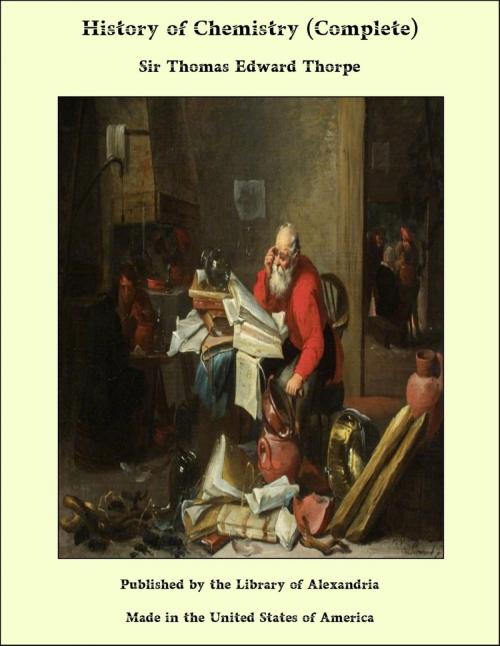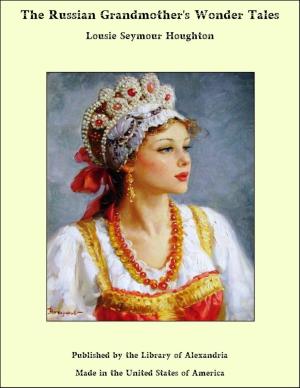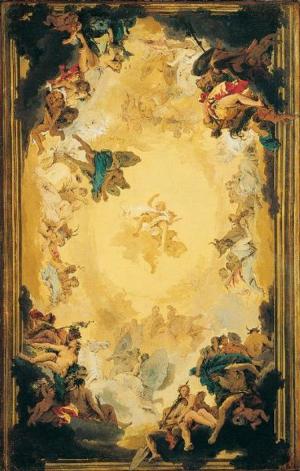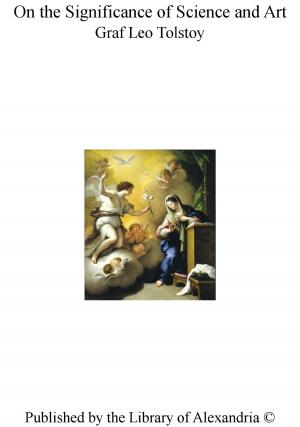History of Chemistry (Complete)
Nonfiction, Religion & Spirituality, New Age, History, Fiction & Literature| Author: | Sir Thomas Edward Thorpe | ISBN: | 9781465618740 |
| Publisher: | Library of Alexandria | Publication: | March 8, 2015 |
| Imprint: | Language: | English |
| Author: | Sir Thomas Edward Thorpe |
| ISBN: | 9781465618740 |
| Publisher: | Library of Alexandria |
| Publication: | March 8, 2015 |
| Imprint: | |
| Language: | English |
Chemistry, as an art, was practised thousands of years before the Christian era; as a science, it dates no further back than the middle of the seventeenth century. The monumental records of Egypt and the accounts left us by Herodotus and other writers show that the ancient Egyptians, among the earliest nations of whom we have any records, had a considerable knowledge of processes essentially chemical in their nature. Their priests were adepts in certain chemical arts, and chemical laboratories were occasionally attached to their temples, as at Thebes, Memphis, and Heliopolis. It is to be supposed, too, that in a cultured class, as the priesthood undoubtedly was, there would be now and again curious and ingenious persons who would speculate on the nature and causes of the phenomena which they observed. But there is no certain evidence that the Egyptians ever pursued chemistry in the spirit of science, or even in the manner in which they and the Chaldæans followed, for example, astronomy or mathematics. The operations of chemistry as performed by them were of the nature of manufacturing processes, empirical in character and utilitarian in result. It was comparatively late in the world’s history that men were found willing to occupy themselves in chemical pursuits in order to gain an insight into the nature of chemical change, and to learn the causes and conditions of its action. Although we have cited the ancient Egyptians as practising the chemical arts, there is no proof that these arts actually originated with them. China, India, Chaldæa have each in turn been regarded as the birthplace of the various technical processes from which chemistry may be said to have taken its rise. Nevertheless, it is mainly from Egyptian records, or from writings avowedly based on information from Egyptian sources, that such knowledge as we possess of the earliest chemical processes is derived. It is significant that the word “chemistry” has its origin in chemi, “the black land,” the ancient name for Egypt. The art itself was constantly spoken of as the “Egyptian art.”
Chemistry, as an art, was practised thousands of years before the Christian era; as a science, it dates no further back than the middle of the seventeenth century. The monumental records of Egypt and the accounts left us by Herodotus and other writers show that the ancient Egyptians, among the earliest nations of whom we have any records, had a considerable knowledge of processes essentially chemical in their nature. Their priests were adepts in certain chemical arts, and chemical laboratories were occasionally attached to their temples, as at Thebes, Memphis, and Heliopolis. It is to be supposed, too, that in a cultured class, as the priesthood undoubtedly was, there would be now and again curious and ingenious persons who would speculate on the nature and causes of the phenomena which they observed. But there is no certain evidence that the Egyptians ever pursued chemistry in the spirit of science, or even in the manner in which they and the Chaldæans followed, for example, astronomy or mathematics. The operations of chemistry as performed by them were of the nature of manufacturing processes, empirical in character and utilitarian in result. It was comparatively late in the world’s history that men were found willing to occupy themselves in chemical pursuits in order to gain an insight into the nature of chemical change, and to learn the causes and conditions of its action. Although we have cited the ancient Egyptians as practising the chemical arts, there is no proof that these arts actually originated with them. China, India, Chaldæa have each in turn been regarded as the birthplace of the various technical processes from which chemistry may be said to have taken its rise. Nevertheless, it is mainly from Egyptian records, or from writings avowedly based on information from Egyptian sources, that such knowledge as we possess of the earliest chemical processes is derived. It is significant that the word “chemistry” has its origin in chemi, “the black land,” the ancient name for Egypt. The art itself was constantly spoken of as the “Egyptian art.”















